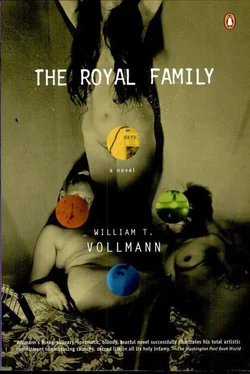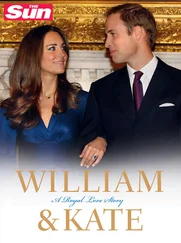William Vollmann - The Royal Family
Здесь есть возможность читать онлайн «William Vollmann - The Royal Family» весь текст электронной книги совершенно бесплатно (целиком полную версию без сокращений). В некоторых случаях можно слушать аудио, скачать через торрент в формате fb2 и присутствует краткое содержание. Год выпуска: 2000, ISBN: 2000, Издательство: Penguin, Жанр: Современная проза, на английском языке. Описание произведения, (предисловие) а так же отзывы посетителей доступны на портале библиотеки ЛибКат.
- Название:The Royal Family
- Автор:
- Издательство:Penguin
- Жанр:
- Год:2000
- ISBN:9780141002002
- Рейтинг книги:5 / 5. Голосов: 1
-
Избранное:Добавить в избранное
- Отзывы:
-
Ваша оценка:
- 100
- 1
- 2
- 3
- 4
- 5
The Royal Family: краткое содержание, описание и аннотация
Предлагаем к чтению аннотацию, описание, краткое содержание или предисловие (зависит от того, что написал сам автор книги «The Royal Family»). Если вы не нашли необходимую информацию о книге — напишите в комментариях, мы постараемся отыскать её.
The Royal Family — читать онлайн бесплатно полную книгу (весь текст) целиком
Ниже представлен текст книги, разбитый по страницам. Система сохранения места последней прочитанной страницы, позволяет с удобством читать онлайн бесплатно книгу «The Royal Family», без необходимости каждый раз заново искать на чём Вы остановились. Поставьте закладку, и сможете в любой момент перейти на страницу, на которой закончили чтение.
Интервал:
Закладка:
He knew that twice a year, for ever on, at New Year’s and on August ninth, which was Irene’s birthday, relatives would clip the errant grassblades from around the corners of her headstone where the mowers of the sexton’s office hadn’t reached, polish the slab with window-cleaner, seat themselves upon a blanket, and sing hymns. She’d be well taken care of.
Taylor Street was full of cars and people in white summer shirts. They almost blinded him, like angels. He drove on.
In the O’Farrell Street parking garage a fat man whose tie was wrapped around his neck came strutting down the white line that spiraled along the path of waiting cars. Ugly cubical lanterns hung in immense grottos, and parking attendants waved their white sleeves.
Tyler got out and locked the car. It was a very hot day. A woman was yelling and sobbing on the pay phone. When she was finished, he dialled John and Irene’s number to see whether Irene’s voice might still be on the answering machine.
Hello? said John curtly.
Tyler hung up.
He’d forgotten that it was a Saturday. No wonder downtown was so crowded. With tentative steps he approached the fresh-smelling, faintly mysterious hedge-walls which ran along the perimeter of Union Square and walled the upsloping sidewalks which comprised the inlets of that park. A Peruvian quartet was playing there. The mandolinist was tight-lipped and intense — difficult to believe so sullen-seeming a fellow could produce such sweet sounds. The drummer, who wore a pillbox hat, kept gazing searchingly about him as he played. Of the other two men Tyler could not glimpse their features as he strode past. Some weary tourist ladies, one very fat and in purple, sat waiting, probably for the more energetic members of their family or other sociological cluster to finish shopping; they applauded the Peruvians from time to time because they were well-mannered ladies, but their expressions of stranded desolation never altered. Their lives were passing, tvacations trickling through the hourglass; moment by moment this warmish blue San Francisco day was being wasted. They sat beneath lush palm-trees, and distantly a trolley-car sounded its bell as he heard the ladies talking about grilled cheese sandwiches; then he was past them and could not hear anymore. (He called his answering machine: No messages.) The Peruvians had ceased. Some moving object, toy-red, caught his eye — an armored car. He wondered which parking garage it patronized. Now the Peruvians had begun again, a sweet song whose flute-wails did indeed remind him of mountains, although if their placard had said that they were Plains Indians instead he might have imagined open spaces. The melody dwindled behind him as he ascended the walkway to the high ground of seated ones and teeming pigeons, more hedges and then the pigeon-adorned column whose base said SECRETARY OF THE NAVY; he’d never taken the time to read the rest, and learn the significance of it. He sat down. A white girl in shorts, with nice breasts and a birthmark on the back of her thigh, hurried quickly past, almost goose-stepping, leaving him with the impression of a bland blurred face half obscured by chestnut hair. Was he the only one who looked at anybody? In the Tenderloin they always gave you the once-over as you went by; here they studied the sky, like astronomers, or watched the children whose hands they held, or spied out the reflections of their destinations upon their moving shoe-toes; let’s not forget that the seated ones had their blizzards of pigeons to watch.
It’s not at all impossible that John will marry again, he thought to himself. In fact, it’s very likely. When that happens, I’d better keep my distance. I’d better move away…
He wondered whether Irene’s parents had insisted on paying for the cemetery plot. She used to go to them in secret for money when she faced some unexpected expense, being afraid to importune John. But John did have that emergency backbone which during crises he could slip into his otherwise hollow spine. Tyler rather thought that he must have donned his most noble and generous armor so that no one could reach him, refusing to let Irene’s family contribute financially or in any other way, unless, as was plausible, they had gotten to choose the minister — their own, most likely. It was impossible to know who’d won, and Tyler couldn’t ask. When he’d offered to help, John had only said: I don’t need anything from you, Hank.
The sunshine felt uncomfortably warm upon his temples. A grey-haired man trudged by, clutching a sweater; out of the side of his eye Tyler saw the man stop to thrust an arm deep into the garbage can, peering, his mouth open. Then he shot suspicious looks at life and went on. Pigeons crawled and thronged. A long Muni bus eased down Stockton Street with a series of squeaks, and passed into shade.
Tyler got up and inspected the column. He read: CAPTURE OR DESTROY THE SPANISH FLEET…
Reflected palm-tendrils swerved and curved in the windows of Macy’s, and skyscrapers’ terraces swelled and bowed there as if in the throes of an immense explosion. The Peruvians’ music, gentle and strangely liquid, seemed the appropriate solvent for this image of dissolution.
| 49 |
Irene and John’s marriage endured for almost four years. Tyler cherished the conviction that according to some divine calendar she hadn’t been his brother’s wife for nearly as long as that, but he was equally certain that he had known Irene much, much longer than four years, which only went to show how inferior to locator fluid was certainty. As long as he could remember, he’d relieved his thoughts every now and then from reality’s blind bonds — a sort of recreation which possessed no power to harm him if he kept simultaneous sight of actuality, ideal and the angle of deflection between them; which is only to say that he trusted himself, not merely because he had to, but because he knew himself so well.
He remembered the first time that he had really been alone with Irene. It was a month or two before the wedding, and Irene, whose car was still in the shop because her sister had borrowed it and hit a lamppost, animated his ruby answering machine light to say that she needed somebody to drive her to the Kobletz outlet, where she and John planned to register. Tyler had been suprised when John, whom he met for lunch, explained that he was too busy; of course John was always busy, but one would have thought that a man so in love with suits and neckties would also be fascinated by the dinner service upon which he and his wife might someday entertain special clients — that is, rich people, whose nature John and Irene, or at least John, hoped progressively to assume. But Mr. Singer was shouting for the Knightman brief, and Tyler, between jobs as usual, had agreed, partly out of the sense of guilt which John usually inspired in him, and partly because it felt honorable, novel and almost titillating to act for the first time in the capacity of brother-in-law; his mother would be happy, too: she always wanted for him and John to get along better. At that time Irene had not made a great impression on him, his attitude scarcely stretching beyond the scrupulously benign. He remembered that as soon as they reached the showroom she’d needed to go in search of a restroom, and he’d sat observing a young couple who’d also come to register bone china for their wedding. The man had a weary, somewhat loutish face. He seemed ill at ease in his big boots, which fortunately made no mark upon the carpet. Tyler could see that he would not be the one to initiate divorce proceedings. Introverted and browbeaten, he might possibly be driven into a fling in three or four years’ time, or the bride might openly take a lover and end matters, but he himself, merely reactive, would wait for the axe to fall. The bride, a slender chestnut blonde, strutted about with a little smile on her face. The bridegroom followed her everywhere while she paced and swooped with tiny delighted cries. Awkwardly, he tried to put his arms around her, but she threw off that embrace with annoyance. Then he retreated to a table in a little thicket of that crystal forest, where he gazed moodily upon the plates and saucers of his future, yawning. The bride bestowed upon everybody, even Tyler, little smiles of rapture. Finally she returned to her groom, knelt beside him, and slipped her arm lightly around his neck as she commenced showing him plates. But he wore a glum face now which could not change. Offended, she retired across the table, and then the pair gazed silently at their knuckles until the saleswoman came. Standing over them, this muse began to reveal arcane principles while they gazed up at her lips like obedient schoolchildren, the girl thrilled to memorize the lesson (which probably had to do with prices), the boy afraid not to. This too was life, this charnel-house of cream pitchers rather than herpid flesh; it was the market, which must be respected.
Читать дальшеИнтервал:
Закладка:
Похожие книги на «The Royal Family»
Представляем Вашему вниманию похожие книги на «The Royal Family» списком для выбора. Мы отобрали схожую по названию и смыслу литературу в надежде предоставить читателям больше вариантов отыскать новые, интересные, ещё непрочитанные произведения.
Обсуждение, отзывы о книге «The Royal Family» и просто собственные мнения читателей. Оставьте ваши комментарии, напишите, что Вы думаете о произведении, его смысле или главных героях. Укажите что конкретно понравилось, а что нет, и почему Вы так считаете.












